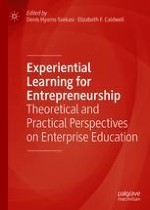2018 | OriginalPaper | Chapter
12. Experiential Learning Through the Transformational Incubation Programme: A Case Study from Accra, Ghana
Authors : Stephen Dobson, Gideon Maas, Paul Jones, Joan Lockyer
Published in: Experiential Learning for Entrepreneurship
Publisher: Springer International Publishing
Activate our intelligent search to find suitable subject content or patents.
Select sections of text to find matching patents with Artificial Intelligence. powered by
Select sections of text to find additional relevant content using AI-assisted search. powered by
